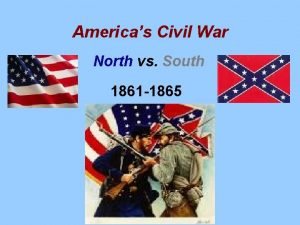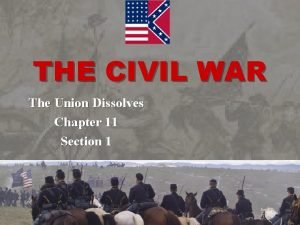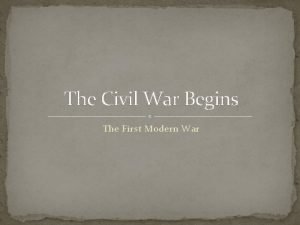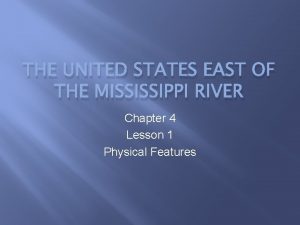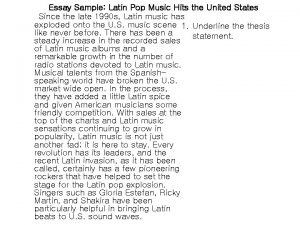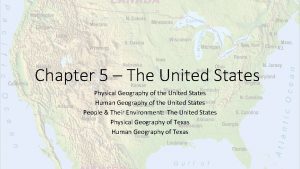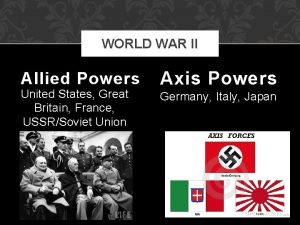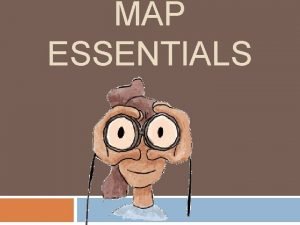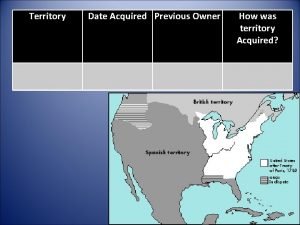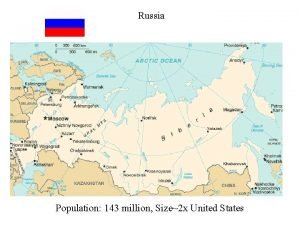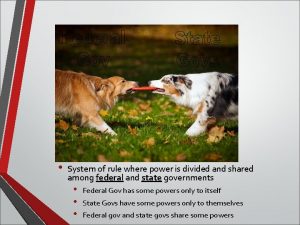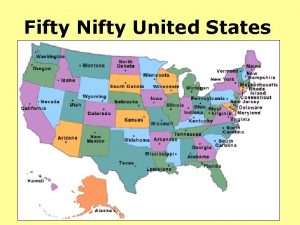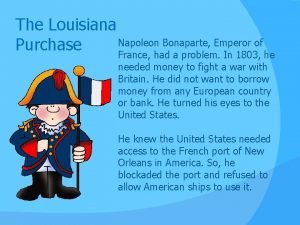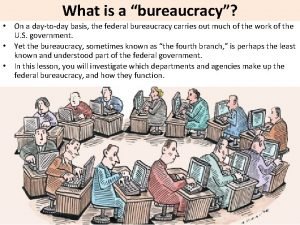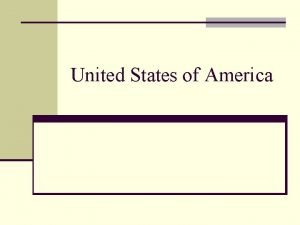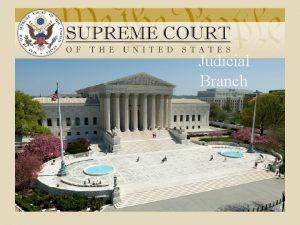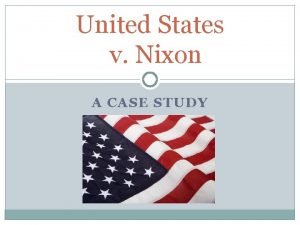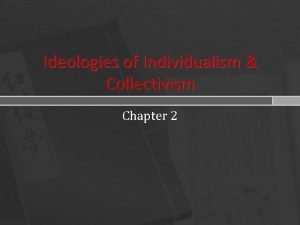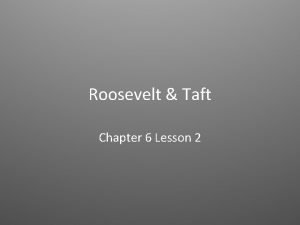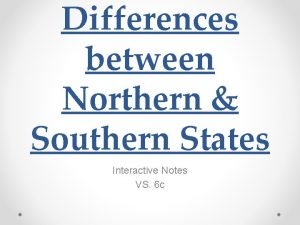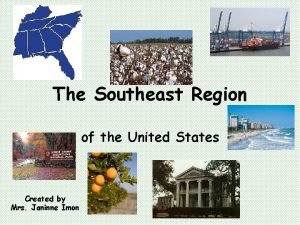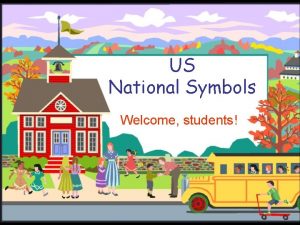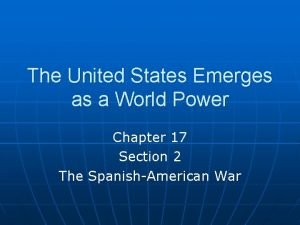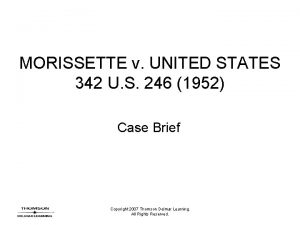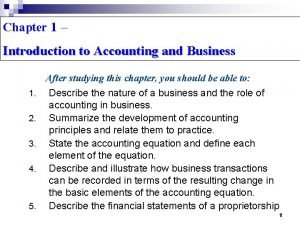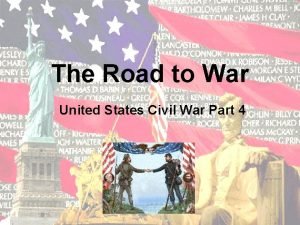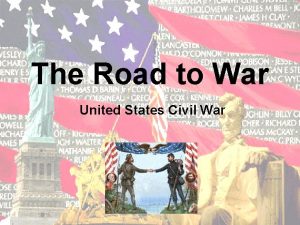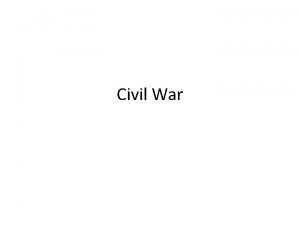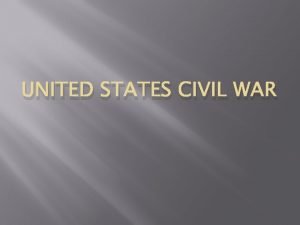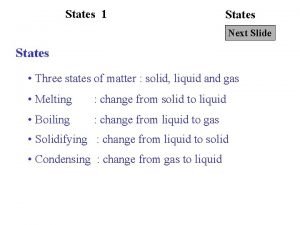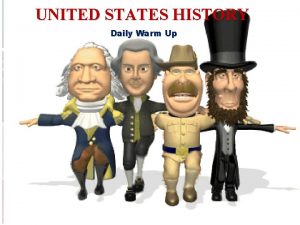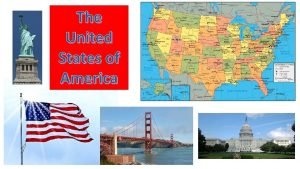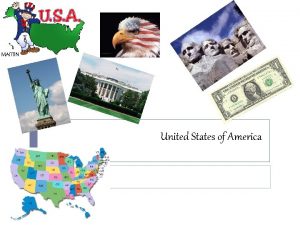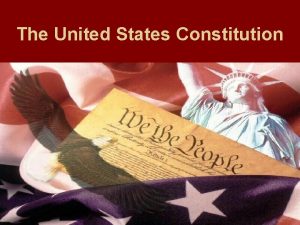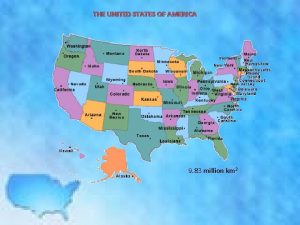The Road to War United States Civil War








































- Slides: 40

The Road to War United States Civil War

Content Area and Grade Level • Fourth Grade TN Benchmarks – At Level 2, the student is able to – 4. 6. spi. 2. determine how the issue of slavery caused political and economic tensions between government policy and people's beliefs (i. e. , abolitionists, plantation owners, state's rights, central government, Loyalists).

Reasons There were 2 main factors that led the United States into the Civil War. Slavery played a part of each factor: • Economic Factors • States Rights

Economic Issues • By 1850 our nation’s territory stretched over forest, plain and mountain. Within these boundaries lived 23 million people in a union comprising 31 states. • The 3 main regions of the U. S. had their own economy.

1850 Business & Industry Wheat Cotton

Big Business and Economy • New England the Middle Atlantic states were the main centers of manufacturing, commerce and finance. Principal products of these areas were textiles, lumber, clothing, machinery, leather and woolen goods.

Machinery and Economy • The Midwest, with its boundless prairies and swiftly growing population, flourished. • The introduction of labor-saving machines made possible an increase in farm production. • The Midwest grew nearly half the nation’s wheat.

Machinery • The Mc. Cormick reaper made possible an increase in wheat production in the Midwest.

King Cotton and Economy • The South’s economy centered on agriculture. • Tobacco was important, but cotton eventually became the dominant crop. • Slaves were used to cultivate all these crops, though cotton most of all.

Slavery • Slavery was inherently a system of brutality and coercion in which beatings and the breakup of families through the sale of individuals were commonplace.

Slave States Territories Slave States Free States

Freedom for Slaves? • The plantation owners feared that if freed, blacks would compete with them for land. • Just as important, the freeing of slaves raised the standing of the poor whites on the social scale. The rich plantation owners did not want this to happen.

Humane? • Southern politicians insisted, for example, that the relationship between capital and labor was more humane under the slavery system than under the wage system of the North.

Slavery • The greatest problem of slavery was not the behavior of individual masters and overseers toward the slaves, but slavery's fundamental violation of every human being's inalienable right to be free.

States Rights • As new territories were being settled the issue of slavery again came to center stage. • Where the newly developed states to be free states or slave states?

No New Slave States • Many Northerners believed that if not allowed to spread, slavery would ultimately decline and die. • California, New Mexico and Utah did not have slavery, and when the United States prepared to take over these areas in 1846, there were conflicting suggestions on what to do with them.

No New Slave States

States Rights • Extremists in the South urged that all the lands acquired from Mexico be thrown open to slave holders. • Antislavery Northerners, on the other hand, demanded that all the new regions be closed to slavery. • Another group proposed that the government should permit settlers to enter the new territory with or without slaves as they pleased and let the people themselves determine the question.

Breaking the Nation Apart • The South wanted to have their own nation and be able to decide what laws to have. The North did not want the country to be broken apart.

Congress Tries to Settle States Rights Question • Compromise of 1850 • Fugitive Slave Law • Kansas-Nebraska Act • Dred Scott Decision

Underground Railroad • Many Northerners continued to help fugitives escape, and made the Underground Railroad more efficient and more daring than it had been before. Discover the secret message hidden in this slave song.

Lincoln • Abraham Lincoln had long regarded slavery as an evil. In a speech in Peoria, Illinois, in 1854, he declared that all national legislation should be framed on the principle that slavery was to be restricted and abolished.

Lincoln Wins

Succession! • The southern states said that if Lincoln won the Presidential election, they would secede (leave) the union. South Carolina was the first southern state to seceded from the union.

Succession! • By February 1, 1861, six more Southern states had joined South Carolina in succession. On February 7, the seven states adopted the constitution for the Confederate States of America. The other southern states as yet remained in the Union.

WAR! • The battle began in April of 1861 when the Confederate Army took over Fort Sumter in Charleston, South Carolina.

Civil War, Death and Destruction • A war had begun in which more Americans would die than in any other conflict before or since.

Civil War, Death and Destruction • A war had begun in which more Americans would die than in any other conflict before or since.

Civil War, Death and Destruction • A war had begun in which more Americans would die than in any other conflict before or since.

Civil War, Death and Destruction • A war had begun in which more Americans would die than in any other conflict before or since.

Civil War, Death and Destruction • A war had begun in which more Americans would die than in any other conflict before or since.

Civil War, Death and Destruction • A war had begun in which more Americans would die than in any other conflict before or since.

Civil War, Death and Destruction • A war had begun in which more Americans would die than in any other conflict before or since.

Civil War, Death and Destruction • A war had begun in which more Americans would die than in any other conflict before or since.

Civil War, Death and Destruction • A war had begun in which more Americans would die than in any other conflict before or since.

Civil War, Death and Destruction • A war had begun in which more Americans would die than in any other conflict before or since.

Civil War, Death and Destruction • A war had begun in which more Americans would die than in any other conflict before or since.

Writing Situation: Pretend you are a news reporter during the years prior to the Civil War. Directions for Writing: Write an news article explaining the causes leading to the Civil War.

Abraham Lincoln, 1858 • “A house divided against itself cannot stand. I believe this government cannot endure permanently half-slave and half-free. ”

Additional Resources • A Day in the Life of A Slave • An Interview with a Slave (listen to a firsthand experience) • Civil War Quiz • American Civil War Homepage • Civil War Photographs
 North and south states civil war
North and south states civil war Chapter 11 section 5 the legacy of the war
Chapter 11 section 5 the legacy of the war North and south states civil war
North and south states civil war Civil war first modern war
Civil war first modern war Toward civil war lesson 3 secession and war
Toward civil war lesson 3 secession and war Civil rights and civil liberties webquest
Civil rights and civil liberties webquest Vision and mission of frsc
Vision and mission of frsc Paved road vs unpaved road
Paved road vs unpaved road Unit 2 the united states and canada worksheet answers
Unit 2 the united states and canada worksheet answers The united states east of the mississippi river lesson 1
The united states east of the mississippi river lesson 1 United states v. cruikshank apush
United states v. cruikshank apush Latin pop music hits the united states
Latin pop music hits the united states Physical geography of the united states
Physical geography of the united states The united states is the greatest buyer positive degree
The united states is the greatest buyer positive degree Was the united states on the axis powers or allied powers?
Was the united states on the axis powers or allied powers? Map of the world with longitude and latitude lines
Map of the world with longitude and latitude lines Forestry and resource management chapter 11 answers
Forestry and resource management chapter 11 answers Contiguous united states land area
Contiguous united states land area Previous owner of british cession
Previous owner of british cession Dubai population pyramid
Dubai population pyramid Polovtsian
Polovtsian United states v lopez commerce clause
United states v lopez commerce clause Fifty nifty united states from thirteen original colonies
Fifty nifty united states from thirteen original colonies Napoleon louisiana purchase
Napoleon louisiana purchase Is the us a bureaucracy
Is the us a bureaucracy What is the geographical position of the united states
What is the geographical position of the united states Where did clowns originate from
Where did clowns originate from Superscore act meaning
Superscore act meaning United states judicial branch
United states judicial branch United states v. nixon significance
United states v. nixon significance Ideology of individualism
Ideology of individualism Kendy vierling
Kendy vierling Chapter 6 lesson 2 roosevelt and taft
Chapter 6 lesson 2 roosevelt and taft Southern states of america
Southern states of america Products of the southeast
Products of the southeast National symbols of america
National symbols of america The united states emerges as a world power
The united states emerges as a world power Morisette v us
Morisette v us Comprises 70% of business entities in the united states
Comprises 70% of business entities in the united states Ibn-tamas v. united states
Ibn-tamas v. united states United states and canada physical map
United states and canada physical map
